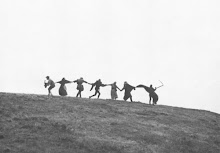 Rachel Carson was the American biologist who raised hell when she published Silent Spring, a seminal criticism of the widespread use of synthetic pesticides and its effect on the environment and on public health. In doing so she came up against a number of very powerful corporate and government interests; but she also alerted a wider audience to issues that, until then, had been considered too scientific for the public to care about.
Rachel Carson was the American biologist who raised hell when she published Silent Spring, a seminal criticism of the widespread use of synthetic pesticides and its effect on the environment and on public health. In doing so she came up against a number of very powerful corporate and government interests; but she also alerted a wider audience to issues that, until then, had been considered too scientific for the public to care about. Today every schoolchild that I know here in Canada has "caring for the environment" as a very central, deeply cherished value. I know this, not because of what they say, but because of what they do. They campaign for energy savings, raise funds for environmental causes, put up posters of endangered animals, heckle their parents into turning off the lights for Earth Hour, and so forth. When Silent Spring was published, in the 1960s, I was a schoolchild. In those days, the simple idea of not throwing your trash out the car window was a concept original enough to be worthy of an entire ad campaign.
Carson's influence was a major catalyst for the banning of DDT as an agricultural pesticide. Her research also exposed the carcinogenic effects of synthetic pesticides; ironically her health began to fail and in 1960, while researching the book, she discovered cysts in her left breast. She had a precautionary mastectomy, but by December 1960 it was discovered the cysts were malignant and had metastasized.
The next two years were a race between the disease and her energy in finishing, publishing, and promoting the book. The corporate opponents, including DuPont and Cyanamid, attacked her research, her credentials, and even her personal character. Former Secretary of Agriculture Ezra Taft Benson wrote to President Eisenhower that, because she was unmarried despite being physically attractive, she was "probably a Communist". By April 1963, however, Silent Spring won the battle of public opinion: a TV special created a widespread public reaction and inspired a congressional review of the dangers of pesticides.
Weakened by the struggle with cancer and with opponents to her ideas, her last public appearance was in May 1963. In early 1964 she was laid low by a respiratory virus; in February she was diagnosed with anaemia caused by the radiation treatments, and in March cancer was discovered in her liver. She died of a heart attack on April 14, 1964.
Source: Wikipedia



No comments:
Post a Comment